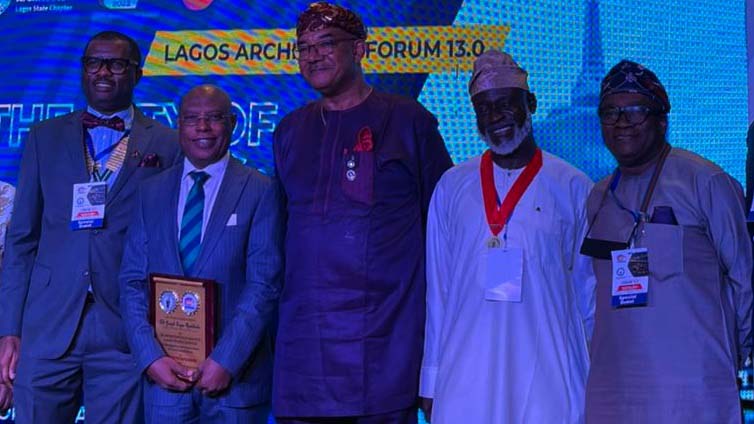To mitigate the incessant collapse of buildings in Lagos State, architects want authorities to strengthen the corporate governance structure in the construction industry.
They charged the government to implement standards such as the adoption of the National Building Code (NBC), which was developed by professionals and expressed the need for experts in the private sector to form strong advocacy groups to stop the menace.

President, Nigerian Institute of Architects (NIA), Mr. Enyi Ben-Eboh (left); President, Commonwealth Association of Surveying and Land Economy (CASLE), Mr. Segun Ajanlekoko; NIA Chairman, Lagos State chapter, Mr. David Majekodunmi; past chairman, Lagos chapter, Olawunmi Agbaje and past NIA president, Tonye Braide during the Architects Forum 2022 in Lagos organised by NIA Lagos chapter
Speaking at the opening ceremony of the Lagos Architects Forum 2022 (LAF 13.0), entitled, ‘The city of Lagos: What is Lagos?’ organised by the Lagos State chapter of the Nigerian Institute of Architects (NIA), a past president of the institute, Mr. Tonye Oliver Braide, said until authorities put corporate governance structure in place in the sector, the state would continue to witness a repeat of collapse structures.
Braide said: “Until we can have proper corporate governance structure on the construction process where we start to track design, supervise stages of construction and certification through a digital platform, building collapse may continue. When we are talking about the city of Lagos, it should not become the capital of building collapse. If there is no procedure on how to do it, we will never get it right.”
“Lagos is technically the digital capital of Nigeria apart from being the economic capital and there is no reason every square metres of Lagos cannot be covered by Global Positioning System (GPS). We have a neighbouring country where everybody has GPS coordinate addresses of their homes. If we can use Uber and Bolt-on our phones and see where taxis are moving, it means we can see buildings as they are being built, and track the materials going into the sites and the source of the steel used for construction to determine if they are from properly certified dealers.”
NIA President, Mr. Enyi Ben-Eboh, noted that the role of the architect in the evolution of cities couldn’t be over-emphasised, stressing that when the architect speaks, everyone should listen.
Ben-Eboh said it is unfortunate that Lagos seems to be leading in terms of how frequent buildings are collapsing, adding that it is connected to the fact that the city is densely populated, demand for land is high and in a bid to make money, people cut corners.
He said there was a need to ensure that conditions for building approvals are well spelt out, and supervised, professionals, should sign off at various stages of building construction to meet up with the design standard, enforce the development process as well as ensure that somebody takes responsibility for any mistake recorded.
“A lot of states have been foot-dragging in terms of domestication of building code. The body code actually has some compliance procedures such that at various stages of the development of a building, relevant professionals sign off at different stages. The Lagos State government should increase inspection of projects. Any site that has the full complement of the necessary professionals supervising construction, the building is not likely to collapse,” he said.
The NIA boss further urged practitioners to key into initiatives of the International Union of Architects (UIA) spearheaded by UIA region five Africa and headed by Tokunbo Omisore, an architect called the ‘Great Green Wall initiative’ in which a student’s ideas competition was launched last month.
The NIA chairman, Lagos State chapter, Mr. David Majekodunmi, observed that there are so many undeveloped urban centres in Lagos that need attention. He said the forum is designed to make the city vibrant, provide opportunities to strengthen professional network and advance the construction industry, and socio-political and economic development of the state.
He appealed to the government, policymakers, regulators, legislators, captains of industries and all industry stakeholders to incorporate the outcomes of the forum into their plans, programmes and policies for a better operating environment.
According to him, Lagos should be one of the famous cities in the world, which can be referred to as “The big city of Africa,” adding that the vibrant city is known for its uniqueness as an economic hub, cultural lifestyle, high-flying businesses that had captivated people from all over the world.
The keynote speaker/President, African Public Relations Practitioners (APRA), Yomi Badejo Okusanya, said architects must engage the Lagos State government to ensure that buildings are not just functional, but aesthetics as well as collaborate with the government in the areas of building approval to ensure iconic structures are erected.
Okusanya said: “Architects must bring communication into the framework of their work. As architects, your role is crucial in designing memorable and sustainable architectural piece that will project and protect the brand Lagos.”
On her part, a past chairman of the Lagos branch, Mrs. Abimbola Ajayi, lamented the reoccurrence of collapse building in Lagos, describing it as a sad development.
She expressed doubt on political will of authorities to stop the collapse of buildings despite the availability of professionals who could mitigate the occurrence.
Abimbola, a member of the state’s Physical Planning Appeals Committee, said: “Government is trying but not enough. If the government needs to be helped, professionals in the private sector have to form a strong advocacy groups to stop the menace. The professionals across the board must rise up and do the right thing to mitigate the menace.”
